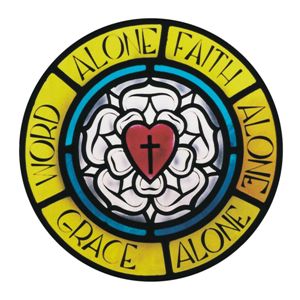We believe that in Baptism God’s grace is offered through the water combined with the Word. Through Baptism God gives individuals the forgiveness of sins, delivers them from death and the devil, and gives eternal life to all who trust in these promises. We believe that children should also receive this gift from God because they too are in need of forgiveness.
Lutherans believe, teach and confess that in Baptism God’s grace is offered through water combined with the promises of His Word. Through Baptism God gives individuals the forgiveness of sins, delivers them from death and the devil, and gives eternal life to all who trust in these promises. We believe that children should also receive this gift from God because they too are in need of forgiveness.
The Bible teaches that a person is saved by God’s grace alone through faith in Jesus Christ alone. The Bible tells us that such “faith comes by hearing” (Romans 10:17). Jesus commands Baptism and tells us that Baptism is water used together with the Word of God (Matthew 28:19-20). Because of this, we believe that Baptism is one of the miraculous means of grace, along with God’s Word (written and spoken) and Holy Communion, through which God creates and strengthens the gift of faith in a person’s heart (Acts 2:38; Acts 22:16; 1 Peter 3:21; Galatians 3:26-27; Romans 6:1-4; Colossians 2:11-12; 1 Corinthians 12:13). The Bible uses terms like “conversion” and “regeneration” to talk about the beginning of faith.” Although we do not claim to fully understand how it happens, we believe that when an infant is baptized God creates faith in his/her heart. We believe this because the Bible says that infants can believe (Matthew 18:6) and that new birth (regeneration) happens in Baptism (John 3:5-7; Titus 3:5-6). The infant’s faith cannot yet, of course, be verbally expressed or articulated by the child, yet it is real and present all the same (Acts 2:38-39; Luke 1:15; 2 Timothy 3:15). The faith of the infant, like the faith of adults, also needs to be fed and nurtured by instruction in God’s Word, or it will die (Matthew 28:18-20).
Lutherans do not believe that only those baptized as infants receive faith. Faith can also be created in a person’s heart by the power of the Holy Spirit working through God’s written or spoken Word. Baptism should then soon follow conversion (Acts 8:37) for the purpose of confirming and strengthening faith in accordance with God’s command and promise. Therefore, depending on the situation Lutherans baptize people of all ages from infancy to adulthood.
Lutherans also do not believe that Baptism is absolutely necessary for salvation. The thief on the cross was saved, apparently without Baptism (Luke 23:43), as were all true believers in the Old Testament era. Jesus implies in Mark 16:16 that it is not the absence of Baptism that condemns a person but the absence of faith, and in addition to Baptism faith is created by the power of the Holy Spirit working through God’s Word. Still, Baptism dare not be despised or willfully neglected, since it is explicitly commanded by our Lord Jesus and has His precious promises attached to it. It is not a mere ritual or symbol, but a powerful means of grace by which God grants faith and the forgiveness of sins.

 1. Grace Alone – We believe, teach, and confess that there is nothing a person can do to earn their salvation. Salvation is a free gift and is based completely on the life, death, and resurrection of Jesus Christ.
1. Grace Alone – We believe, teach, and confess that there is nothing a person can do to earn their salvation. Salvation is a free gift and is based completely on the life, death, and resurrection of Jesus Christ.